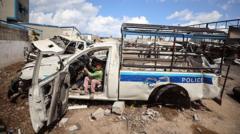Despite rising expectations, significant challenges remain in negotiations between Israel and Hamas regarding conditions for peace and the future of hostages.
**Cautious Optimism Surrounds Potential Gaza Ceasefire Amid Netanyahu's U.S. Visit**

**Cautious Optimism Surrounds Potential Gaza Ceasefire Amid Netanyahu's U.S. Visit**
As Israel's Prime Minister Benjamin Netanyahu engages in talks with U.S. President Donald Trump, there are renewed hopes for a ceasefire in Gaza after 21 months of conflict.
In a significant diplomatic meeting, Israeli Prime Minister Benjamin Netanyahu is in Washington, sparking cautious optimism for a potential ceasefire in the ongoing Gaza conflict, which has lasted for over 21 months. U.S. President Donald Trump has expressed his belief that a deal is within reach, having urged Netanyahu to prioritize ending the violence. Netanyahu noted that discussions with Trump could facilitate a much-anticipated resolution, highlighting the delicate nature of the ongoing negotiations.
Indirect talks between Israel and Hamas resumed in Qatar, aimed at establishing a 60-day ceasefire and addressing the hostage situation. However, skepticism remains as key points of contention persist. In Gaza, residents share mixed feelings about a potential truce. Many, including Nabil Abu Dayah, express a desire for a complete end to warfare rather than a temporary solution, voicing fears of renewed violence after any short ceasefire.
Protests have erupted in Israel, calling for the government to act decisively to secure the release of approximately 50 hostages still in Hamas custody, with families demanding immediate action rather than a phased approach. The fears of families, like Ilay David's, who yearn for the safe return of loved ones held captive, underscore the emotional weight of the situation amid the deteriorating humanitarian conditions in Gaza.
Netanyahu's trip comes after a notable shift in Israeli public support following military actions against Iranian nuclear sites, which appears to have bolstered his negotiating power, even against the wishes of his far-right coalition partners. Concurrently, analysts suggest Hamas has been somewhat weakened, potentially making it more amenable to negotiating terms.
As discussions progress, issues remain, particularly over humanitarian aid and the timeline for troop withdrawals. Netanyahu’s administration has shown a hardline stance on disarming Hamas, complicating the pathway to a lasting peace agreement. The situation remains fluid, and with troop casualties rising and humanitarian needs escalating, the pressure to reach an agreement has intensified.
As the talks unfold, they reflect a desperate need for resolution on both sides, with Gaza’s humanitarian crisis deepening and calls for immediate aid growing louder. The international community is closely monitoring the developments, poised for any potential shifts in the tense stalemate. The coming days are critical, as Netanyahu's visit and the ongoing negotiations will determine the fate of many trapped in this protracted conflict.
Indirect talks between Israel and Hamas resumed in Qatar, aimed at establishing a 60-day ceasefire and addressing the hostage situation. However, skepticism remains as key points of contention persist. In Gaza, residents share mixed feelings about a potential truce. Many, including Nabil Abu Dayah, express a desire for a complete end to warfare rather than a temporary solution, voicing fears of renewed violence after any short ceasefire.
Protests have erupted in Israel, calling for the government to act decisively to secure the release of approximately 50 hostages still in Hamas custody, with families demanding immediate action rather than a phased approach. The fears of families, like Ilay David's, who yearn for the safe return of loved ones held captive, underscore the emotional weight of the situation amid the deteriorating humanitarian conditions in Gaza.
Netanyahu's trip comes after a notable shift in Israeli public support following military actions against Iranian nuclear sites, which appears to have bolstered his negotiating power, even against the wishes of his far-right coalition partners. Concurrently, analysts suggest Hamas has been somewhat weakened, potentially making it more amenable to negotiating terms.
As discussions progress, issues remain, particularly over humanitarian aid and the timeline for troop withdrawals. Netanyahu’s administration has shown a hardline stance on disarming Hamas, complicating the pathway to a lasting peace agreement. The situation remains fluid, and with troop casualties rising and humanitarian needs escalating, the pressure to reach an agreement has intensified.
As the talks unfold, they reflect a desperate need for resolution on both sides, with Gaza’s humanitarian crisis deepening and calls for immediate aid growing louder. The international community is closely monitoring the developments, poised for any potential shifts in the tense stalemate. The coming days are critical, as Netanyahu's visit and the ongoing negotiations will determine the fate of many trapped in this protracted conflict.



















